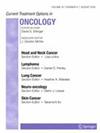生化复发前列腺癌的最新治疗方法。
IF 3.8
2区 医学
Q2 ONCOLOGY
Current Treatment Options in Oncology
Pub Date : 2024-03-01
Epub Date: 2024-01-03
DOI:10.1007/s11864-023-01164-2
引用次数: 0
摘要
意见陈述:生化复发前列腺癌(BCR)患者是一个异质性群体,因此个性化的治疗方法至关重要。具有高风险特征(如 PSA 倍增时间 (PSADT) ≤ 9-12 个月)的患者需要更早地进行影像学检查以发现转移灶,并考虑在仅 BCR 期加强治疗(除间歇性雄激素剥夺治疗外)。BCR 阶段是影响疾病生存和延缓转移进展的独特机会。来自 EMBARK 试验的有力证据表明,ADT 单一疗法不再是高风险 BCR 患者的最佳选择。本文章由计算机程序翻译,如有差异,请以英文原文为准。
Updates on Management of Biochemical Recurrent Prostate Cancer.
Opinion statement: Patients with biochemical recurrent prostate cancer (BCR) are a heterogeneous group, whereby a personalized approach to management is critical. Patients with high-risk features such as PSA doubling time (PSADT) ≤ 9-12 months warrant earlier imaging for metastasis detection and consideration for intensified therapy (beyond intermittent androgen deprivation alone) during this phase of BCR-only disease. The BCR phase represents a unique opportunity to impact disease survival and delay metastasis progression. There is compelling evidence from the EMBARK trial that ADT monotherapy is no longer the optimal consideration for high-risk BCR patients.
求助全文
通过发布文献求助,成功后即可免费获取论文全文。
去求助
来源期刊

Current Treatment Options in Oncology
ONCOLOGY-
CiteScore
7.10
自引率
0.00%
发文量
113
审稿时长
>12 weeks
期刊介绍:
This journal aims to review the most important, recently published treatment option advances in the field of oncology. By providing clear, insightful, balanced contributions by international experts, the journal intends to facilitate worldwide approaches to cancer treatment.
We accomplish this aim by appointing international authorities to serve as Section Editors in key subject areas, such as endocrine tumors, lymphomas, neuro-oncology, and cancers of the breast, head and neck, lung, skin, gastrointestinal tract, and genitourinary region. Section Editors, in turn, select topics for which leading experts contribute comprehensive review articles that emphasize new developments and recently published papers of major importance, highlighted by annotated reference lists. We also provide commentaries from well-known oncologists, and an international Editorial Board reviews the annual table of contents, suggests articles of special interest to their country/region, and ensures that topics are current and include emerging research.
 求助内容:
求助内容: 应助结果提醒方式:
应助结果提醒方式:


